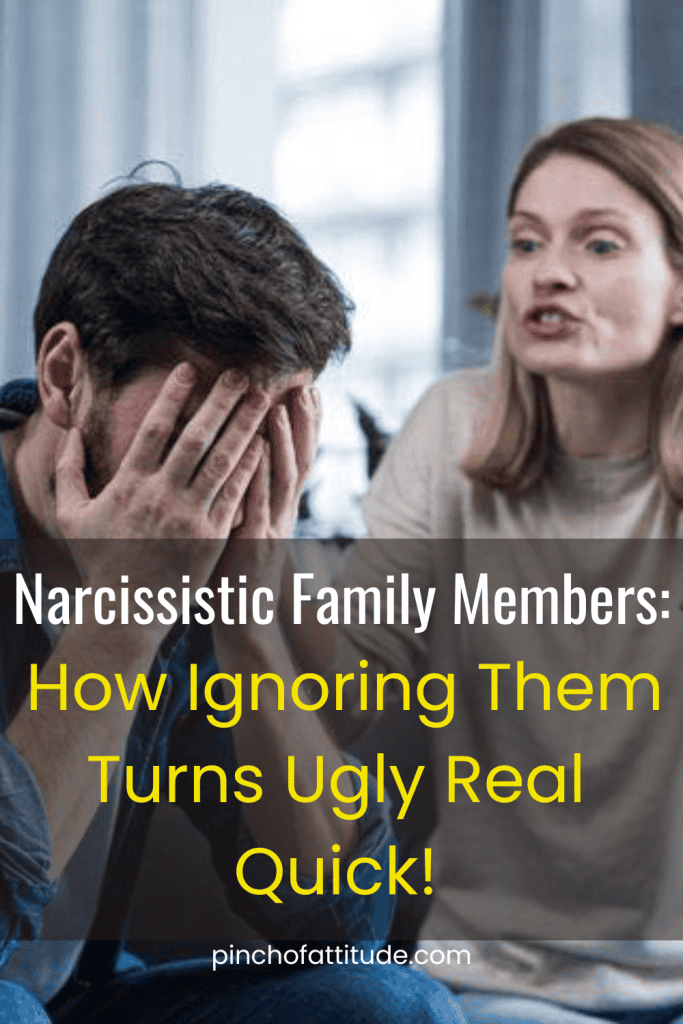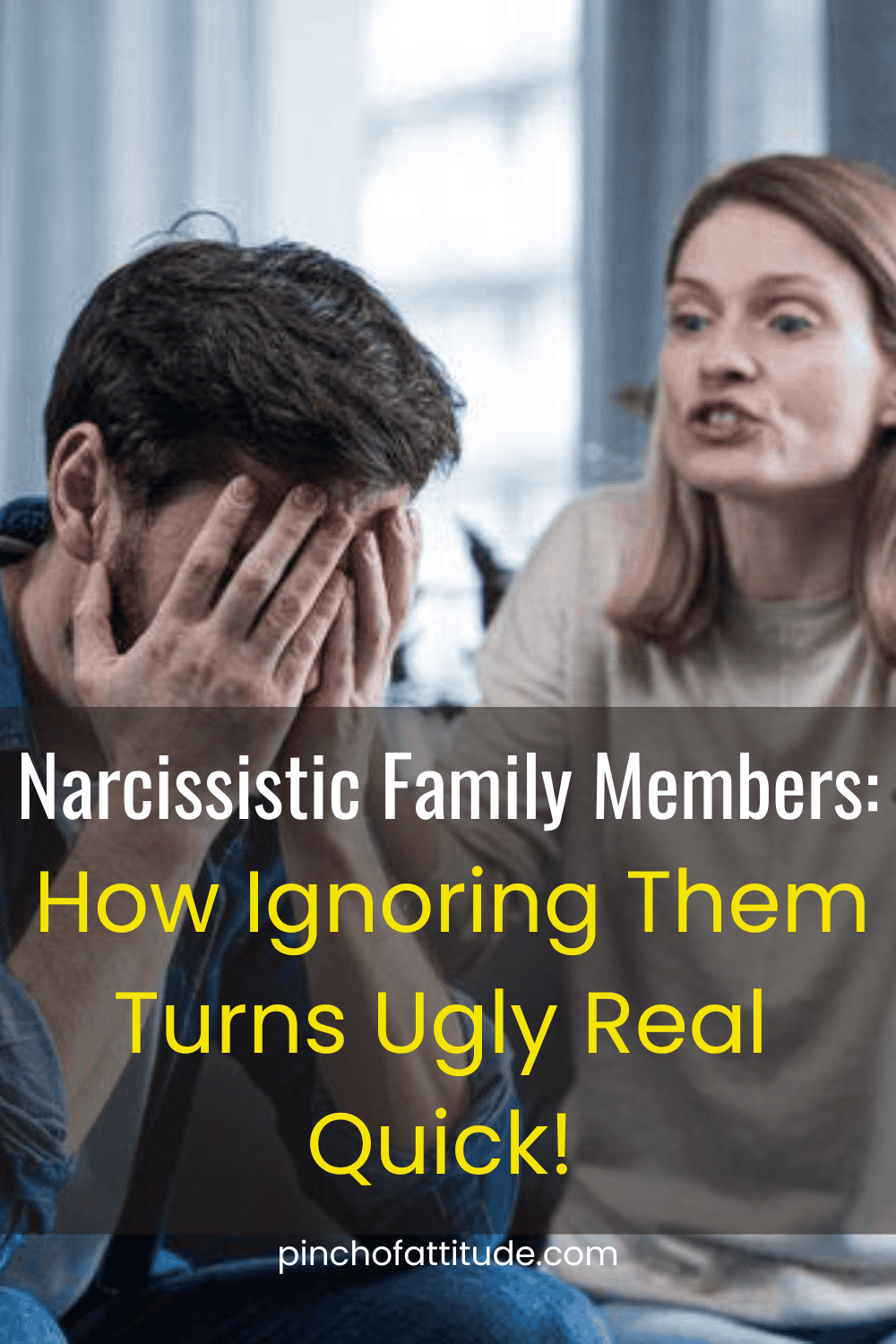Growing up with a narcissistic relative was like walking on eggshells.
Their relentless need to be the center of attention often came at the expense of their loved ones, leaving a trail of hurt and confusion in their wake.
I know this because I’ve been there for way too long.
For years, I’ve had to constantly navigate the treacherous waters of my mother’s narcissistic tendencies, trying to balance her demands with my own sense of self.
It was an exhausting and emotionally draining experience that left me feeling drained and lost.
But what happens when you ignore a narcissist family member? What if you finally decide to stand up for yourself and stop feeding into their narcissistic tendencies?
Inspired by my own personal growth, I’m here to share my insights on the power of prioritizing self-care when dealing with a narcissist in the family.
- Anticipate increased attempts for attention when you decide to ignore a narcissist. Stay firm in your decision by limiting responses and prioritizing your well-being.
- When you ignore a narcissist, you regain control over your emotional well-being. Focus on self-preservation.
- Ignoring a narcissist leads to peace, improved mental health, and boosted confidence. Prioritize self-worth, and surround yourself with those who uplift and support you.
Table of Contents
What Happens When You Ignore a Narcissist Family Member?

When you decide to ignore a narcissistic family member, you are essentially breaking free from their manipulative hold and taking back control of your own emotional well-being.
This process is not without its challenges, but the rewards can be immense. I went through and I’m glad I did.
Below are 13 things from my personal experience that happen when I start ignoring a narcissistic family member:
1. They Will Increase Their Attempts to Get Your Attention
When you start ignoring a narcissistic person, be prepared for an uptick in their attempts to grab your attention.
Known as love bombing, a narcissist may try to shower you with excessive affection, compliments, or gestures to regain control.
In my experience, ignoring my mother led to a barrage of text messages laden with over-the-top expressions of affection.
It’s a tactic aimed at breaking down your boundaries and re-establishing their influence.
The more you resist, the more persistent they may become in their efforts to reel you back into their orbit.

2. They May React With Anger, Hostility, or Attempts to Retaliate
Often, ignoring a narcissist will enrage them to the point where they resort to verbal abuse, name-calling, or threats to try to regain control.
In extreme cases, things can get even more heated and result in narcissistic rage, an explosive mix of anger and manipulation.
There was one instance where my mother spread false rumors about me within the family, tarnishing my reputation to elicit sympathy and turn others against me.
She also manipulated my close relationships by feeding misinformation to friends, creating a rift and isolating me further.
These calculated moves underscored the lengths a narcissistic family member might go to when feeling their control slipping away.
But it’s important to stay calm and assertive in the face of these reactions. Avoid engaging in arguments or providing them with the attention they seek.
3. They Might Spread Misinformation or Rumors About You to Other Family Members
When ignored, a narcissist often resorts to spreading misinformation or rumors, especially within the family.
This narcissistic behavior aims to tarnish your reputation and manipulate others into siding with the narcissist.
It’s a tactic employed to ensure they get what they want, a means of furthering their agenda and maintaining a semblance of dominance within the family dynamic.
The spread of misinformation becomes a weapon in their arsenal when faced with the threat of losing control.
Sadly, I know this all too well.
As part of her attempts to regain control, my mother engaged in a calculated campaign, painting a distorted picture of me as an abuser and her as the victim.
4. They May Attempt to Make You Feel Guilty for Ignoring Them
A narcissist won’t hesitate to try anything to make you feel like the one at fault, leveraging guilt as a tool to regain influence and control in the relationship.
Using emotional manipulation, they might give you the silent treatment or employ tactics to trigger guilt.
It’s actually a classic narcissistic move. They will gladly play on your emotions to regain the upper hand and secure the attention they crave.

5. They Will Portray Themselves as the Victim to Get Attention and Sympathy
Narcissists thrive on painting a picture of their suffering, hoping to gain support and admiration from others.
You see, by positioning themselves as victims, they aim at taking control of the situation, reshaping the narrative to suit their agenda.
It’s a strategic move aimed at taking control of the situation, manipulating perceptions, and ensuring that the spotlight remains on them.
In my case, my mother would often fabricate stories about her hardships, exaggerating her problems and portraying herself as the victim of unfair circumstances.
This behavior was a desperate attempt to gain attention and sympathy, deflecting responsibility from her own actions and shifting the focus back onto her.
6. They Might Use Various Tactics to Re-Engage With You, Don’t Fall For It
A narcissist may use various manipulative tactics like gaslighting to try to get some reaction from you.
They may try to make you doubt your own memory or perception of events, or they may even attempt to make you feel like you’re the one who is crazy for ignoring them.
In my case, my mother would often gaslight me by denying her own hurtful words and actions, making me feel like I was the one who was misremembering events.
She would also try to manipulate me by playing the victim card, blaming me for the strained relationship, and portraying herself as the one who was wronged.
Their goal is to regain control and manipulate you back into their orbit, but don’t give in. Stay firm in your decision to ignore them and focus on your own well-being.
7. They Might Engage in Smear Campaigns to Damage Your Reputation
Narcissists don’t take rejection lightly, and their inclination towards manipulation can manifest in spreading false information about you.
Since they cannot tolerate being ignored, they resort to spreading rumors, lies, and half-truths to tarnish your reputation.
Doing so is a means for them to regain a semblance of control and retaliate against the perceived threat of being ignored.
They may spread these damaging stories to your friends, family, colleagues, or even social media followers, hoping to isolate you and erode your support system.

8. You Will Experience a Decrease in Stress and Anxiety Levels
Having any kind of relationship with a narcissist can take a toll on anybody’s mental health and may cause chronic stress and anxiety.
So, by choosing to ignore them, you are essentially removing a major source of stress from your life.
In my experience, ignoring my narcissistic mother brought a noticeable decrease in my anxiety levels.
Since the constant fear of her unpredictable behavior no longer loomed over me, I found myself sleeping better, feeling less on edge, and able to enjoy life with a newfound sense of calm.
While the process may not be easy, the rewards of a calmer, healthier life are well worth the effort. It was a liberating experience as if a heavy weight had been lifted from my shoulders.
9. Your Self-Esteem and Confidence Will Improve Drastically
Ignoring a narcissist may lead to a significant boost in self-esteem and confidence.
In a narcissistic relationship, your self-worth is constantly under attack. Their need for validation often comes at the expense of your own, leaving you feeling belittled, insecure, and unworthy.
When you choose to disengage from this toxic dynamic, you are essentially reclaiming your power and self-worth.
As for me, ignoring my mother meant I no longer felt the constant need to seek her approval or validation.
I started to believe in myself and my abilities, and I began to appreciate my own unique qualities.
This newfound confidence allowed me to pursue my goals and aspirations with greater determination and self-belief.

10. You Will Experience Strain in Your Family Relationships
Narcissists often isolate their victims from their support network, making it difficult to maintain healthy relationships with friends and family members.
This is especially true if you’re ignoring a narcissistic family member.
Some people may not understand your decision to disengage, and they may even side with the narcissist, creating additional strain in your relationships.
In my case, ignoring my mother led to a period of estrangement from my extended family.
Some family members sided with my mother, believing her fabricated stories about me, while others simply avoided getting involved in the conflict.
This isolation was challenging, but it also forced me to lean on my true friends for support, strengthening those bonds in the process.
11. You Will Feel Peace From Not Having to Deal With Constant Manipulation and Criticism
Breaking free from the clutches of narcissistic abuse ushers in a profound sense of peace.
Liberating yourself from the relentless manipulation and criticism that define such relationships is like stepping out of a toxic game orchestrated by a skilled manipulator.
Narcissists thrive on chaos. By choosing to ignore them, you are essentially removing yourself from their toxic game.
Ignoring my narcissistic mother brought a profound sense of relief.
I no longer felt the constant pressure to walk on eggshells, anticipating her next outburst or manipulative tactic. And I could finally relax and enjoy moments of peace.
12. Your Mental Health and Well-Being Will Improve

A relationship with someone showing narcissistic tendencies can damage one’s mental health, causing stress, anxiety, and emotional exhaustion.
Choosing to ignore them means you’re depriving them of their narcissistic supply.
And the release from the emotional burden of catering to their constant demands and manipulations means you can finally prioritize your well-being.
In my experience, disengaging from my mother brought about a remarkable improvement in my mental health.
The decision to break free from her toxicity marked a turning point in my life. I noticed a positive shift in my mental health, which contributed to an overall sense of emotional well-being.

13. There’s a Risk You’ll Be Isolated From Other Family Members, That’s Okay!
When you choose to disengage from a narcissistic individual, they may attempt to alienate you from other family members, portraying you as the problem.
Narcissists often manipulate situations to turn families against each other, creating a division to serve their agenda.
So, while the prospect of isolation can be daunting, understand that prioritizing your well-being may require standing alone against the toxicity.
But remember, it’s not your responsibility to maintain relationships with individuals who do not respect your boundaries or prioritize your well-being.
True friends and family members will eventually recognize the positive impact of your decision and respect your need for healthy relationships.
Surround yourself with those who uplift and support you, and don’t let the fear of isolation prevent you from taking steps towards your own peace and happiness.
Why Do Narcissists Hate Being Ignored?
Narcissists hate being ignored because their grandiose sense of self-importance requires constant validation and attention from others.
When you start ignoring a narcissist, you’re essentially withdrawing the fuel that feeds their ego, and they experience a significant loss of power and control.
Their reaction to being ignored can vary depending on their individual personality and coping mechanisms.
Some narcissists may react with anger, hostility, and even verbal abuse, trying to regain control of the situation and manipulate you back into their orbit.
Others may resort to guilt-tripping, playing the victim, or spreading rumors to isolate you and erode your support system.
3 Ways I Dealt With a Narcissist Rage in My Family
Dealing with the unpredictable waters of narcissistic rage can be emotionally draining.
While going no-contact is often the best way to deal with a narcissist and protect your own well-being, it’s not always easy to maintain composure in the face of their rage.
Here are three ways I’ve used to deal with a narcissist rage in my family:
1. Emotional Buffering With Visualization Techniques
This technique helps you maintain your emotional composure when you’re trying to navigate the storm of a narcissist’s anger.
By envisioning a protective barrier, you create a mental space that helps prevent their rage from infiltrating your emotional well-being.
It’s an effective way to maintain a sense of calm and resilience in the face of the intense emotions characteristic of a narcissist’s outburst.
2. Pattern Interruption Through Unexpected Kindness
When faced with their intense reactions, surprise them with unexpected kindness. This disrupts the negative pattern of their behavior, catching them off guard.
Instead of escalating the conflict, they’ll momentarily be taken aback, as the situation doesn’t go according to their expected script.
By introducing a contrasting element of compassion or empathy, you don’t go along with the anticipated confrontation.
This creates a brief pause in their rage and may potentially defuse the intensity of the moment.
3. Strategic Non-Engagement With Compassionate Detachment
The key is to recognize that direct contact with the narcissist isn’t conducive to resolution. Instead, continue to ignore the provocation and adopt an approach of compassionate detachment.
This means acknowledging their emotions without becoming emotionally entangled.
By not getting drawn into the chaos and maintaining a sense of compassion from a distance, you create a boundary that safeguards your emotional well-being.
Related Posts:
- 5 Things That Set Your Narcissistic Family Off!
- How to Protect Yourself From Narcissistic Family Members? My Personal Advice
- How to Set Boundaries With a Narcissistic Family? 15 Ways I Used That Work
- 12 Rules of a Dysfunctional Narcissistic Family: Sadly, They’re All Damaging
- Healing From Narcissistic Family Abuse: My Story, Your Hope
Frequently Asked Questions
What happens when you ignore the narcissist in your family?
When you ignore a narcissist, you break their cycle of manipulation and control. This can lead to improved mental health, reduced stress, and a stronger sense of self-worth.
Will a narcissist go away if you ignore them?
Ignoring a narcissist may not necessarily make them leave you alone. They may try various tactics to regain your attention, such as love bombing, smear campaigns, or even threats.
Can a narcissist change and how do you know?
Narcissists can change, but it requires a significant and sustained effort on their part. Signs of change include increased self-awareness, willingness to take responsibility for their actions, and a reduction in manipulative behaviors.
How do you become strong against a narcissist?
Dealing with narcissistic individuals involves setting boundaries, practicing self-care, and seeking support from trusted individuals.
How do you make a narcissist feel weak?
Make a narcissist feel weak by not giving them what they want. Set boundaries and refuse to be manipulated to make them feel out of control.





Thank you for your advice 🙏 ☺️